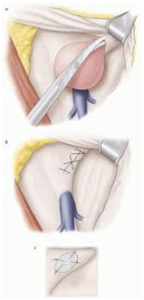Femoral Hernia
Femoral hernia is an infrequent type of hernia which appears in the inguinal area, just like the inguinal hernia. It occurs when the viscera protrude via a weak point of the abdominal wall.
Depending on its place, it is distinguished in the right and left femoral hernia. Usually, the organ which protrudes is the small intestine.
More often it appears in old, obese and multiparous women, as a small round swelling in the inferior part of the inguinal area.
Causes of Femoral hernia
Femoral hernia can occur due to the following factors:
- Constipation
- Weight lifting
- Obesity
- Persistent Cough
- Multiparity
- Old age
Symptoms of femoral hernia
In most cases, femoral hernia has minimal symptoms. As a result, in a percentage of 25%, it cannot be diagnosed in time and there is very high risk of incarceration and necrosis of the intestine.
When the femoral hernia is incarcerated, the patient feels intense pain and swelling in the area, accompanied by nausea and vomiting. Accordingly, there is a high risk of peritonitis.
Treatment of femoral hernia
Femoral hernia is treated only surgically. Nowadays, surgery is performed under local anesthesia with a lot of advantages for the patient and, in certain occasions, through laparoscopic surgery and, consequently, under general anesthesia.
Laparoscopic Reconstruction of Femoral Hernia vs Reconstruction under local anesthesia

Laparoscopic surgery for the reconstruction of femoral hernia is performed, mainly, using the technique of the extraperitoneal access, using a mesh.
Using the laparoscopic technique, the surgeon makes 3 small incisions inside the abdominal wall of the patient, through which he will introduce the laparoscope and the special tools, with which he will perform the necessary actions for the operation.
The laparoscopic method offers rapid recovery, minimum postoperative pain, a very good aesthetic result and allows the patient to return home usually the next day.
During reconstruction under local anesthesia, the operation is performed under no general anesthesia, with only one small incision, which is hidden under the bikini line. Postoperative pain is minimum, the patient returns home usually on the same day, the aesthetic result is excellent, while the intra-abdominal complications that can be caused by laparoscopy are avoided.
If you have any concerns or want to learn more with regard to treatment of femoral hernia, please do not hesitate to contact the doctor at (+30) 2313048684. The General Surgeon Dr Anthimidis Giorgos MSc, PhD, is at your disposal.
